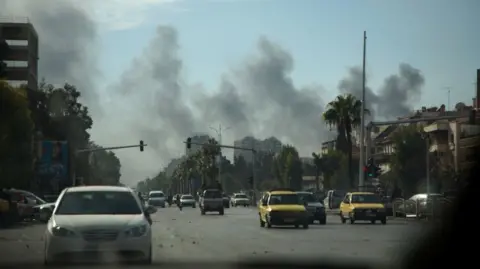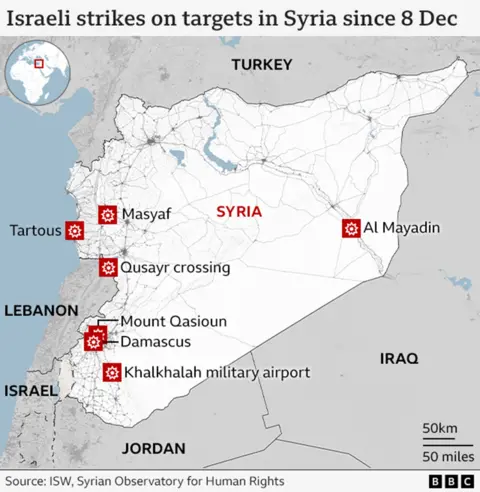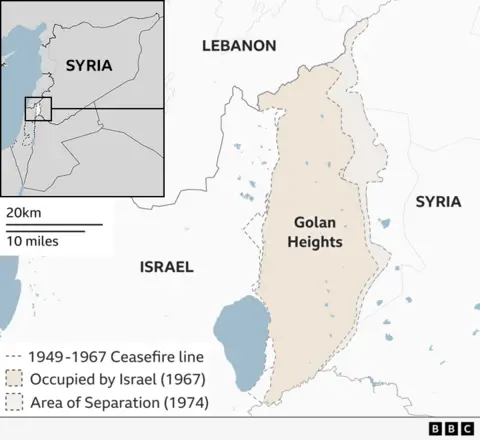
 Getty Images
Getty ImagesSyrian media reports say that Israeli warplanes carried out dozens of attacks throughout the country, including the capital, Damascus.
The UK-based Syrian Observatory for Human Rights said there were more than 100 raids on military targets.
Among the sites bombed was a research center suspected of being linked to chemical weapons production, according to local media reports.
Israel says it is working to prevent weapons from falling “into the hands of extremists” after the overthrow of the Assad regime.

Meanwhile, the United Nations Security Council meets to discuss the situation in the country following the fall of President Bashar al-Assad.
The Syrian Observatory for Human Rights says hundreds of Israeli air strikes have been launched in the past two days, including a site in Damascus said to have been used to develop missiles by Iranian scientists.
These strikes come at a time when the United Nations Chemicals Control Organization is warning the authorities in Syria to ensure the safety of suspected stockpiles of chemical weapons.
According to the United Nations Organization for the Prohibition of Chemical Weapons, a chemical weapon is a chemical used to cause death or intentional harm through its extrinsic toxic properties.
The use of chemical weapons is prohibited under international humanitarian law regardless of the presence of a legitimate military target, because the effects of these weapons are indiscriminate in nature.
It is not known where or how many chemical weapons Syria possesses, but it is believed that former President Bashar al-Assad maintained stockpiles and that the declaration he made was incomplete.
Syria signed the chemical weapons certification issued by the Organization for the Prohibition of Chemical Weapons in 2013, a month after the chemical weapons attack on the outskirts of the capital, Damascus, in which the nerve agent sarin was used and killed more than 1,400 people.
The horrific images of victims convulsing in pain shocked the world. Western powers said the attack could only be carried out by the government, but Assad blamed the opposition.
Although the Organization for the Prohibition of Chemical Weapons and the United Nations have destroyed all 1,300 tons of chemicals declared by the Syrian government, chemical weapons attacks in the country continue.
BBC analysis in 2018 confirmed that between 2014 and 2018, Chemical weapons have been used in the Syrian Civil War at least 106 times.
The Organization for the Prohibition of Chemical Weapons said on Monday that it had contacted Syria “with the aim of emphasizing the paramount importance of ensuring the safety and security of all materials and facilities related to chemical weapons” in the country.
Also on Monday, the Israeli military released photos of its forces crossing from the Israeli-occupied Golan Heights into the demilitarized buffer zone in Syria where UN peacekeepers are stationed.
This comes a day after Israeli Prime Minister Benjamin Netanyahu announced that the army had done so Control temporarily The United Nations said that the 1974 disengagement agreement with Syria “collapsed” with the rebels taking control of the country.
The Golan Heights is a rocky plateau about 60 kilometers (40 miles) southwest of Damascus.
Israel captured the Golan from Syria in the final stages of the Six-Day War in 1967 and annexed it unilaterally in 1981. The move was not recognized internationally, although the United States did so unilaterally in 2019.
Speaking at a press conference on Monday, Saar said the IDF was only taking a “very limited and temporary step” that had been taken for “security reasons.”
He also claimed that Israel had no interest in interfering in Syrian internal affairs and was only interested in defending its citizens.
Meanwhile, Defense Minister Israel Katz said the IDF “will destroy heavy strategic weapons” including missile and air defense systems.

Israel's latest moves come after Syrian opposition fighters seized the capital, Damascus, and overthrew Bashar al-Assad's regime. He and his father have held power in the country since 1971.
Forces led by the Islamist opposition group Hay'at Tahrir al-Sham entered Damascus in the early hours of Sunday morning, before appearing on state television to announce that Syria was now “free.”
On Sunday, Netanyahu described the collapse of the Assad regime as a “historic day in the Middle East.”
The Assad regime received a lot of support from Hezbollah and Russia in the country's brutal civil war. With Hezbollah embroiled in the Israel-Gaza war and cross-border air strikes between Israel and Lebanon, and Russia spending huge resources in its invasion of Ukraine, Hay'at Tahrir al-Sham, along with other rebel groups in Syria, was able to seize the occasion and was able to make it happen. Ultimately capable of seizing large areas of Syria.
During the 2011 Syrian uprising, Israel saw Assad, despite being an ally of both Iran and Hezbollah, as a better bet than he might follow his regime.
Netanyahu insisted on Sunday that Israel would “send a hand of peace” to Syrians who want to live in peace with Israel.
He said that the IDF's presence in the buffer zone is a “temporary defensive position until an appropriate arrangement is reached.”
He said: “If we can establish neighborhood relations and peaceful relations with the new forces emerging in Syria, this is our desire. But if we do not do that, we will do whatever it takes to defend the State of Israel and Israel's borders.”
Israel is likely to be more sensitive about the Golan Heights, because the family of Hay'at Tahrir al-Sham leader Abu Muhammad al-Julani has roots there. Thousands of Israeli settlers now live in the area alongside about 20,000 Syrians, most of whom are Druze, who remained there after its seizure.
Israeli strikes in Syria are not new. It has previously admitted carrying out hundreds of strikes in recent years on targets in Syria that it says are linked to Iran and allied armed groups such as Hezbollah.
Israeli strikes in Syria have reportedly become more frequent since the start of the war in Gaza in October 2023, in response to cross-border attacks on northern Israel by Hezbollah and other groups in Lebanon and Syria.
Just last month, the Syrian Observatory for Human Rights, a UK-based monitoring group, reported that a set of strikes hit an arms depot and other sites in and around Palmyra where families of Iranian-backed militia fighters were located. , 68 Syrian and foreign fighters were killed








